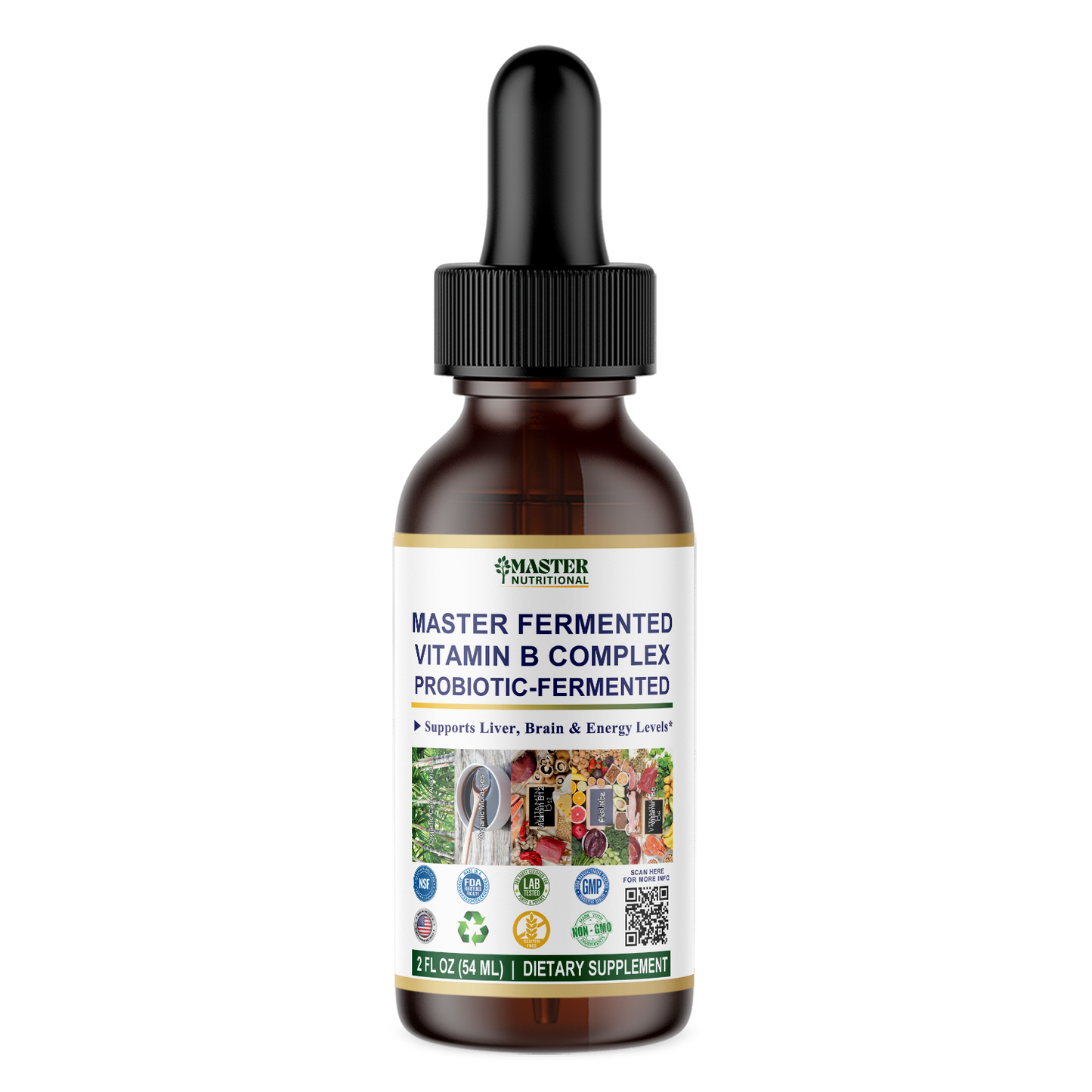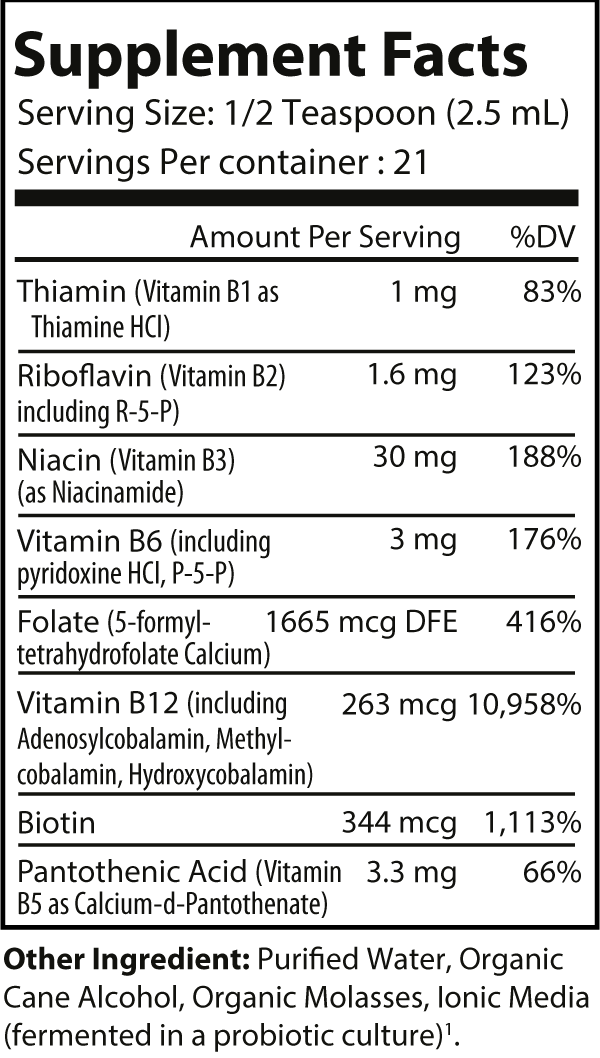Medical Grade Supplement Line
Top Master Fermented Vitamin B Complex for Total Body Wellness
Top Master Fermented Vitamin B Complex for Total Body Wellness
Enjoy 5% Discount Code: MDAY24, valid till August 31, 2025
Couldn't load pickup availability
Welcome to Master Nutritional, where health is redefined through innovation. Our flagship product, Master Fermented Vitamin B Complex 2 fl oz, is a testament to cutting-edge science and expert formulation. Tailored to support liver, immune, and adrenal health while promoting mood balance and heightened energy levels, the Fermented B Complex formula is a holistic approach to well-being.

What is Master Fermented Vitamin B Complex?
This revolutionary approach is fortified by our proprietary ND Technology, enhancing oral absorption and bioenergetic properties. Similarly, Master Nutritional also developed Master Vitamin B Complex Fermented Super Formula for Full-Spectrum Vitality Boost.
Setting new standards in the nutrition industry, our groundbreaking probiotic-fermented B vitamins distinguish Master Fermented Vitamin B Complex.
Users attest to remarkable effects from the first dose, validating the exceptional quality and efficacy of our formula. Our commitment to excellence extends to the manufacturing process.
Key Features
✓ Gluten-Free.
✓ All-Natural.
✓ Made in the USA.
✓ Non-GMO.
✓ Zero Added Sugar.
✓ Vegan-Friendly.
✓ Vegetarian.
✓ Organic Ingredients.
✓ Corn-Free.
✓ Lactose-Free.
✓ Manufactured at an NSF Certified Facility (NSF/ANSI 455).
Formula Ingredients of Master Fermented Vitamin B Complex
Explore the benefits of each component, from Thiamine supporting aerobic energy metabolism to Biotin promoting cellular energy, hair, and skin health.
Is it Safe to Use Master Fermented Vitamin B Complex?
Comparing our formula to others on the market reveals a stark contrast. Master Fermented Vitamin B Complex 2 fl oz utilizes third-party, independently tested ingredients and is produced in an FDA-registered facility. In contrast, some competitors source cheap ingredients from polluted soils.
Why Choose Master Fermented B Vitamins Complex?
- Master Nutritional's Master Fermented Vitamin B Complex contains high-quality B vitamins, ensuring a bioavailable and efficaciously dosed formula.
- Others may compromise with synthetic, cheap B-vitamins that may contain heavy metals and fillers.
- The incorporation of ND Technology gives us a competitive edge, enhancing oral absorption and bioenergetic properties.
- This patented nutrient delivery system sets us apart from formulas lacking such innovation.
Select Our Master Fermented Vitamin B Complex Now ☟
Master Nutritional's Master Fermented Vitamin B Complex is a cutting-edge solution for comprehensive health support. With revolutionary probiotic-fermented B vitamins and patented ND Technology, our formula ensures superior absorption and effectiveness.
Sources:
Gasperi, V., Sibilano, M., Savini, I., & Catani, M. V. (2019). Niacin in the Central Nervous System: An Update of Biological Aspects and Clinical Applications. International journal of molecular sciences, 20(4), 974. https://doi.org/10.3390/ijms20040974
9.Gentilcore D. (2016). Louis Sambon and the Clash of Pellagra Etiologies in Italy and the United States, 1905-14. Journal of the history of medicine and allied sciences, 71(1), 19–42. https://doi.org/10.1093/jhmas/jrv002
10.Kirkland J. B. (2009). Niacin status and treatment-related leukemogenesis. Molecular cancer therapeutics, 8(4), 725–732. https://doi.org/10.1158/1535-7163.MCT-09-0042
11.Hoskin, P., Rojas, A., & Saunders, M. (2009). Accelerated radiotherapy, carbogen, and nicotinamide (ARCON) in the treatment of advanced bladder cancer: mature results of a Phase II nonrandomized study. International journal of radiation oncology, biology, physics, 73(5), 1425–1431. https://doi.org/10.1016/j.ijrobp.2008.06.1950
Ueland, P. M., McCann, A., Midttun, Ø., & Ulvik, A. (2017). Inflammation, vitamin B6 and related pathways. Molecular aspects of medicine, 53, 10–27. https://doi.org/10.1016/j.mam.2016.08.001
Bird R. P. (2018). The Emerging Role of Vitamin B6 in Inflammation and Carcinogenesis. Advances in food and nutrition research, 83, 151–194. https://doi.org/10.1016/bs.afnr.2017.11.004
Mascolo, E., & Vernì, F. (2020). Vitamin B6 and Diabetes: Relationship and Molecular Mechanisms. International journal of molecular sciences, 21(10), 3669. https://doi.org/10.3390/ijms21103669
van de Lagemaat, E. E., de Groot, L., & van den Heuvel, E. (2019). Vitamin B12in Relation to Oxidative Stress: A Systematic Review. Nutrients, 11(2), 482. https://doi.org/10.3390/nu11020482
Romain, M., Sviri, S., Linton, D. M., Stav, I., & van Heerden, P. V. (2016). The role of Vitamin B12 in the critically ill--a review. Anaesthesia and intensive care, 44(4), 447–452. https://doi.org/10.1177/0310057X1604400410
Shipton, M. J., & Thachil, J. (2015). Vitamin B12 deficiency - A 21st century perspective . Clinical medicine (London, England), 15(2), 145–150. https://doi.org/10.7861/clinmedicine.15-2-145
Bailey, L. B., Stover, P. J., McNulty, H., Fenech, M. F., Gregory, J. F., 3rd, Mills, J. L., Pfeiffer, C. M., Fazili, Z., Zhang, M., Ueland, P. M., Molloy, A. M., Caudill, M. A., Shane, B., Berry, R. J., Bailey, R. L., Hausman, D. B., Raghavan, R., & Raiten, D. J. (2015). Biomarkers of Nutrition for Development-Folate Review. The Journal of nutrition, 145(7), 1636S–1680S. https://doi.org/10.3945/jn.114.206599
Thakur, K., Tomar, S. K., Singh, A. K., Mandal, S., & Arora, S. (2017). Riboflavin and health: A review of recent human research. Critical reviews in food science and nutrition, 57(17), 3650–3660. https://doi.org/10.1080/10408398.2016.1145104
Suwannasom, N., Kao, I., Pruß, A., Georgieva, R., & Bäumler, H. (2020). Riboflavin: The Health Benefits of a Forgotten Natural Vitamin. International journal of molecular sciences, 21(3), 950. https://doi.org/10.3390/ijms21030950
DiNicolantonio, J. J., Niazi, A. K., Lavie, C. J., O'Keefe, J. H., & Ventura, H. O. (2013). Thiamine supplementation for the treatment of heart failure: a review of the literature. Congestive heart failure (Greenwich, Conn.), 19(4), 214–222. https://doi.org/10.1111/chf.12037
Saedisomeolia, A., & Ashoori, M. (2018).Thiamine in Human Health: A Review of Current Evidences. Advances in food and nutrition research, 83, 57–81. https://doi.org/10.1016/bs.afnr.2017.11.002
Ragaller, V., Lebzien, P., Südekum, K. H., Hüther, L., & Flachowsky, G. (2011). Pantothenic acid in ruminant nutrition: a review. Journal of animal physiology and animal nutrition, 95(1), 6–16. https://doi.org/10.1111/j.1439-0396.2010.01004.x
Mock DM. Biotin: From Nutrition to Therapeutics. J Nutr. 2017 Aug;147(8):1487-1492. doi: 10.3945/jn.116.238956. Epub 2017 Jul 12. PMID: 28701385; PMCID: PMC5525106.
Patel DP, Swink SM, Castelo-Soccio L. A Review of the Use of Biotin for Hair Loss. Skin Appendage Disord. 2017 Aug;3(3):166-169. doi: 10.1159/000462981. Epub 2017 Apr 27. PMID: 28879195; PMCID: PMC5582478.
Vidmar Golja, M., Šmid, A., Karas Kuželički, N., Trontelj, J., Geršak, K., & Mlinarič-Raščan, I. (2020). Folate Insufficiency Due to MTHFR Deficiency Is Bypassed by 5-Methyltetrahydrofolate. Journal of clinical medicine, 9(9), 2836. https://doi.org/10.3390/jcm9092836
Share





